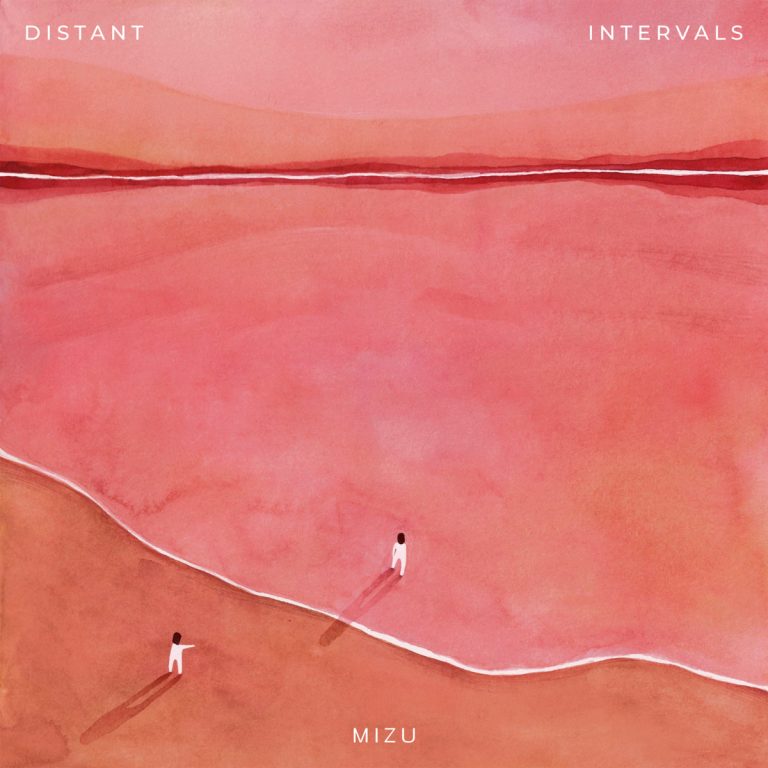It’s almost impossible to discern it, but the music on Distant Intervals comes from a bedroom closet. Brooklyn cellist and composer MIZU hunkered down in the tiny space to make the nine tracks of her debut album, but so dense and full is her music you would be convinced on first listen that it was recorded in a reverberating cathedral or a concert hall. Cello figures weave in and out of each other, creating landscapes in landscapes; hundred layers of overdubbed cello and processed samples create detail that feels far off, like a mountain range on the edge of the horizon, or a flock of birds fluttering high above you between the clouds.
At its busiest, Distant Intervals doesn’t seem like the work of one artist either. It’s a testament to MIZU’s ability to improvise and create from layered up tracks until the whole thing feels positively orchestral. Consider “Aubade (The Farewell Is a Beginning)”, where the effect of all the surfaces feels like a choir is hiding behind all the strings, almost like musical elements are pressing up against and fighting each other for your attention. Taking cues from Peter Gregson or even Max Richter at moments, this is ambient music that is almost deceptively deliberately formed; form and structure is there, but only when the tension and layers build to breaking point do they obviously reveal themselves.
And these moments of tension are some of the most invigorating moments on the album. The dark hues of penultimate track “Fugato (Night’s Transfiguration)” build from a two note alarm-like melody. From there the music branches out, forming into a thick molasses-like consistency, as a repeating scale builds the tension until breaking point at the track’s end. “Elegy (As Soft Night Marches In)” features a similar trick, crescendoing at its final moment until it drops into the digital percussive bleeps and tomb-like funereal drum of “Toccata (Kisses of Earth)”. These times when MIZU builds a dense thicket of cello until it all comes to a head, leave you unable to focus on much else. All you can do is sit tight and wait for the release.
MIZU excels when she gives the needed time to let these build ups happen over a suitable amount of time; the music is best in small sets so as to let the music feel like it’s evolving and spreading out. Opening track “Prelude (An Eternity of Light)” starts from grainy, quiet squeaks before feeling like a bright morning stretch of a piece. As it bleeds into “Aubade (The Farewell Is a Beginning)” and its rubbery, repetitive plucked rhythm, the track finds motion, like a locomotive gliding smoothly along the tracks.
The other end of the album hosts the best combination as the aforementioned nighttime feel of “Fugato (Night’s Transfiguration)” makes way for standout final track “Aveu (The Beginning Is a Farewell)” where Oakland-based artist Maria BC adds in some truly transcendent vocals. Evoking Julianna Barwick’s best work, the heavenly vocals help the track swell and soar; caught up in its gorgeous effect, it’s hard to imagine it not being the music you hear as you ascend to the pearly gates.
The material in between these two bookends are by no means bad, but they don’t have quite as memorable or intoxicating an effect, seeming to exist to transport you elegantly from one side of the album to the other. There are welcome sonic additions, like the above-mentioned percussive details on “Elegy (As Soft Night Marches In)” and “Toccata (Kisses of Earth)”, while “Aria (I Stand by the Reflecting Pool and Remember)” bobs along gently like a boat on soft waves as the sound of children playing in the background and reversed tape effects make for a liquidy bed which the cello lines build upon. Elsewhere, tracks like “Interlude (Sunken Citadels)” are pleasant enough with swirls of dense noise but have little to say otherwise. Likewise “Serenata (To a Hidden Moon)” has an appropriately nocturnal edge, but it feels searching for something above all else.
At 38 minutes Distant Intervals is a small world but not one that leaves space unadorned. Like a strong perfume used a little too heavily, sometimes the album does leave you wanting for a little more blank or sparsely decorated area. But MIZU uniformly sounds explorative across Distant Intervals, always searching for that delectable moment of synergy. The album has a few of them, but sometimes listening feels like being lost in the fog waiting for the lighthouse’s illuminating beam to break through. From her bedroom closet MIZU shoots that shaft of light outwards, occasionally capturing that sweet, blissful moment of musical transcendence – and also capturing the listener’s attention at the same time.
[Editor’s note: This article originally referred to the artist as Issei Herr, but she is now MIZU]

